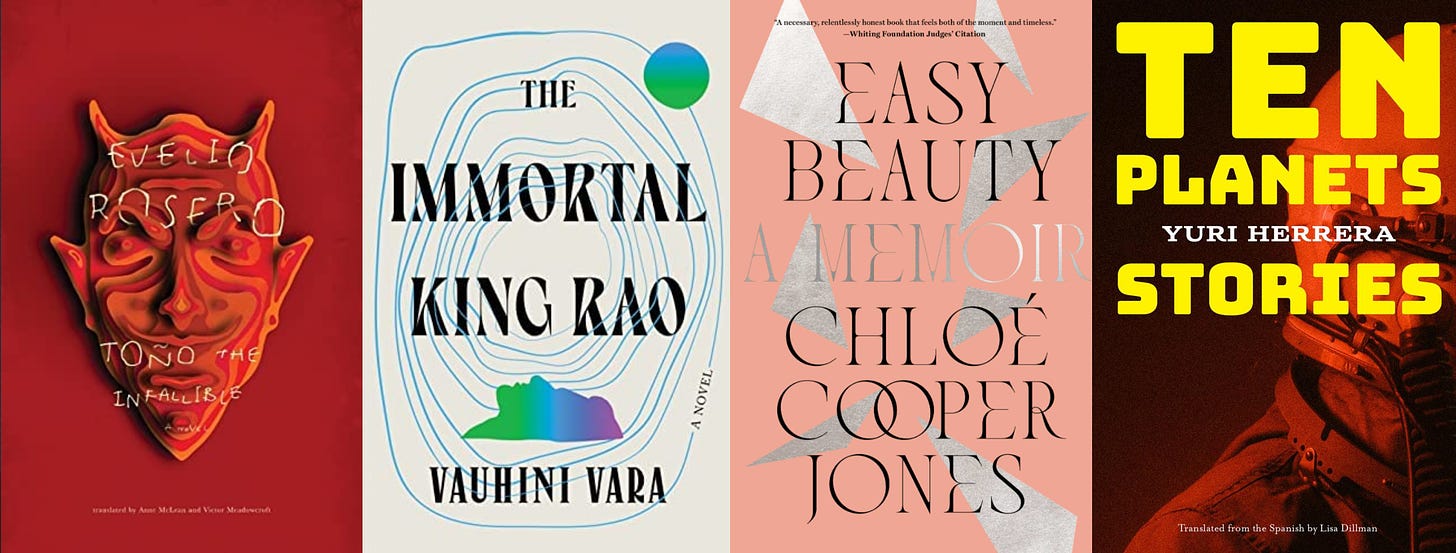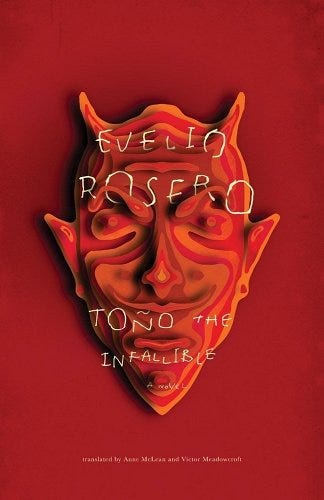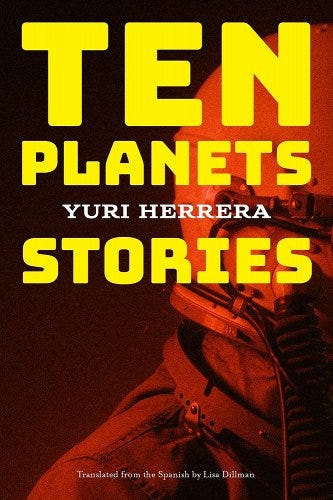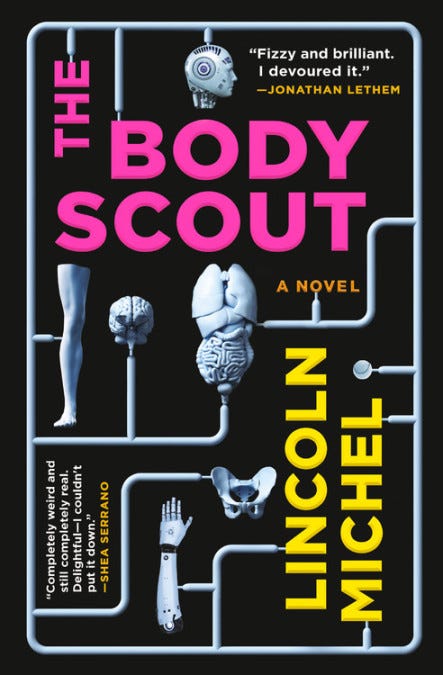Three Great Books You Might Have Missed (Plus One to Put on Your Radar)
Some thoughts on "best of" lists and recommending a few stand-out 2022 books
We’re at the end of November, which means the start of the most stressful time for writers: year-end list season. Well, a stressful time for authors with a new book out. Those of us without a 2022 release can just sit back and eat our turkey and sip our eggnog etc. until the new year is rung in.
I don’t have to worry about a book being or not being on lists this year, and I’m happy to longer be responsible for making them as a critic. “Best of” lists are always suspect to begin with, but especially so for books because there are simply so many published each year and so little time to read them all. A dedicated filmgoer might be able to catch most of the major Hollywood releases in a year, but even the most dedicated reader will only be scratching the surface of what’s published. I read about 50-100 books a year, yet at least half are older titles and many of the recent ones are from the year prior or three years ago or so on. Ultimately, I never read enough new releases to have any kind of handle on what was published in a given year. And, frankly, I’m pretty sure that’s the case for most list-compilers.
Anyway, since I don’t have to compile lists anymore I try to instead regularly recommend a few great books I think could use a little more attention. Here’s the last entry from 2021:
My 2022 reading was lighter than normal—and my teaching load correspondingly heavier—and I only reviewed two novels, both for The New York Times: How High We Go in the Dark by Sequoia Nagamatsu, an inventive and moving science fiction novel that follows humanity’s grief after a global plague, and Saha by Cho Nam-Joo, which was a interesting although not entirely successful (for me) blend of character portraits and dystopian fable. I also blurbed a few novels I’d recommend checking out: Gretchen Felker-Martin’s bloody and gutsy trans horror novel Manhunt, Victor Manibo’s smart SF noir novel The Sleepless about a world in which some people have ceased sleeping, and Rick Claypool’s grotesque children’s book for adults Tentacle Head.
In terms of books I didn’t blurb or review, here are a few that stood out to me this year:
Toño the Infallible by Evelio Rosero
First up is the most recent book I finished: Evelio Rosero outrageous, vile, and wild Toño the Infallible. Rosero is a major contemporary Colombian author, but I’ll confess Toño is the first of his I’ve read. The novel has a strange structure and centers on a writer describing his long and fraught history with the titular Toño, a giant misanthropic and misogynistic brute who seems to compel and disgust everyone he meets. The book contains a fair amount of violence, sexual and otherwise, which made even me squirm at points. However, ultimately the book is simply compelling. Rosero’s prose—as translated by Victor Meadowcroft and Anne McLean—is mesmerizing. He writes in a deeply expressionist style in which it’s often (intentionally) hard to tell what is actually happening, yet the unreality never quite rises to the level of magical realism or fabulism.
The novel reminded me in a strange way of Blood Meridian, with Toño Ciruelo as a Colombian version of The Judge: an embodiment of their country’s violence and horrors. There’s even a similar hallucinatory quality to both novels’ prose, although Rosero has a lot more dark humor. E.g., his novel opens with Ciruelo appearing at the narrator’s door with a horrible case of diarrhea: “And then the most harrowing sounds could be heard: the bowels of Toño Ciruelo, my acquaintance (I could never call him a friend), emptied out over the ceiling and the walls, they flooded the foundations, breached the windows, laid claim to this old Bogotá neighborhood, shook it, until the entire city collapsed in on itself.”
Gross, yes, but also beautiful. Which also sums up the book.
The Immortal King Rao by Vauhini Vara
Another novel that really stuck with me this year was Vauhini Vara’s The Immortal King Rao, a near-future speculative fiction novel about a world where tech CEOs have undermined democracy and lead the world to climate catastrophe. So… realism. I interviewed Vara earlier this year for this newsletter and described the novel this way:
The Immortal King Rao is a true genre-bender mixing family drama, historical fiction, tech satire, and near-future science fiction into a unique and engrossing novel. The story spans time from 1950s India to 1970s America and a future where the world’s citizens have become “Shareholders” in an algorithm-driven corporate dystopia. There’s so much I loved in this novel. The tech satire is razor sharp—Vara has long worked as a tech journalist—and Vara’s prose is equal parts moving, humorous, and thought-provoking.
Easy Beauty by Chloé Cooper Jones
This memoir is not a book I could officially review as Chloé is an old and dear friend (and I appear briefly in the memoir), but since this is my newsletter and I can do whatever I want here I’ll say this was one of the best books of 2022 and you should read it immediately!
Easy Beauty is one of those rare memoirs that blends a whole lot of different subjects—aesthetics, motherhood, disability, sports, Beyoncé, Richard Serra—yet still feels whole. Jones is a terrific stylist, and the prose is consistently beautiful. But perhaps the most impressive part is how Easy Beauty balances its philosophical questions with its various subjects. There’s lots of books out there that pretend to think deeply about popular culture but, frankly, have nothing to say. Jones—who has both a creative writing degree and a philosophy PhD—does think deeply about each subject, treating pop stars with the same critical eye as classical sculptures, and is able to convey the deeper ideas across to readers who might not be familiar with aesthetic philosophy. At the same time, Jones writes movingly about motherhood and disability and how she navigates the world. Easy Beauty will make you think and feel at the same time.
I thought I’d end with a 2023 release you should put on your radar: Ten Planets by Yuri Herrera.
Herrera is one of my favorite contemporary writer. His previous books are largely crime novels, sharp and literary noirs set in Mexico or the US/Mexico border. I’ve loved each one, although Signs Preceding the End of the World is probably the best. His style is taut and minimalists, each book being novella length. Ten Planets is a very different book. It has the same minimalism—most of the short stories are only a few pages—but instead of crime stories, these stories are science fiction and fantasy tales. I loved them. They combined big and fun SF ideas with taut storytelling and great literary style. Imagine Golden Age pulp SF stories rewritten by Borges, perhaps. Watch out for this book next year, if that description appeals to you.
Those are a few suggestions if you’re looking for a new book to read or a present for the holiday. Links to Bookshop.org, which is having a sale through Monday with code GIFT15.
As always, if you like this newsletter, please consider subscribing or checking out my recently released science fiction novel The Body Scout, which The New York Times called “Timeless and original…a wild ride, sad and funny, surreal and intelligent” and Boing Boing declared “a modern cyberpunk masterpiece.”











Thank you!. Added Herrera to my list
Adding all of these to the TBR list